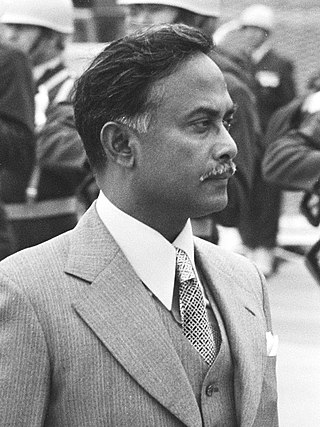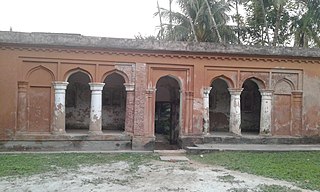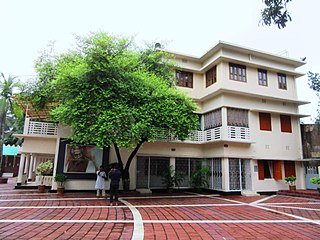Related Research Articles

Sheikh Mujibur Rahman, also known by the honorific Bangabandhu, was a Bangladeshi politician, revolutionary, statesman, activist and diarist, who was the founding leader of Bangladesh. As the leader of Bangladesh, he had held continuous positions either as Bangladesh's president or as its prime minister from April 1971 until his assassination in August 1975. His nationalist ideology, socio-political theories, and political doctrines are collectively known as Mujibism.

Ziaur RahmanBU HJ HOR was a Bangladeshi military officer, freedom fighter and politician who served as the sixth President of Bangladesh from 1977 until his assassination in 1981. One of the leading figures of country's Liberation War, he broadcast the Bangladeshi declaration of independence on 27 March 1971 from Chittagong. He was the founder of Bangladesh Nationalist Party (BNP). He previously served as the third chief of army staff from 1975 to 1978 with a minor break.

Gopalganj is a district in the Dhaka Division of Bangladesh. The district has 1,172,415 inhabitants and its surface area is 1,490 km2. The main town of the district is also called Gopalganj. It is the bank of the Madhumati river and located at 23°00’47.67" N 89°49’21.41". It is bounded by Faridpur district on the North, Pirojpur and Bagerhat district on the south, and Barisal district on the east and Narail district on the West. This district is also known as "GP" to the youth. Gopalganj is subdivided into five sub-districts (upazila/thana).

Faridpur District is a district in south-central Bangladesh. It is a part of the Dhaka Division. It is bounded by the Padma River to the northeast. The district was named for its headquarters, the city of Faridpur, which itself was named for Farīd-ud-Dīn Masʿūd, a 13th-century Sufi saint. A separate district was created by severing Dhaka district in 1786 and was called Dacca Jelalpur. A municipality was established in 1869. Historically, the town was known as Fatehabad. It was also called Haveli Mahal Fatehabad.
The Ispahani family, also known as the House of Ispahani, are a Perso-Bengali business family. In Bangladesh, they own and manage M. M. Ispahani Limited, one of the country's leading conglomerates. Originally hailing from Isfahan, Iran, the family have been settled in the Indian subcontinent for more than two centuries.
Muhammed Abul ManzurBU was a Bangladeshi military officer who commanded the Bangladesh Forces operations in Sector 8 during the Bangladesh Liberation War against Pakistan in 1971. He was allegedly involved in the assassination of the then-president of Bangladesh, Ziaur Rahman. The erstwhile chief of army staff and alleged mastermind of Rahman's assassination, Hussain Muhammad Ershad, had put a standing shoot-to-kill order on Manzur's life—he was killed shortly after being captured at the border. About a year later, Ershad initiated a bloodless coup d'état and took over the central government, holding power until 1990.

Rashid Hossain Choudhury was a Bangladeshi second generation artist, sculptor, writer and professor. He played a major part in the art movements and improvement in the art-related educational institutions of Bangladesh. He has received numerous awards and recognition for creative contribution and innovative influence. During the 1950s, he had been a significant pioneer in the modern art movement in Bangladesh.

Fazlul Quader Chowdhury was a Bengali politician who served as the 5th speaker of the National Assembly of Pakistan from East Pakistan. He belonged to Ayub Khan's Convention Muslim League. He was also the acting president of Pakistan from time to time when Ayub Khan left the country. His elder brother Fazlul Kabir Chowdhury was the leader of the opposition in East Pakistan assembly. Quader was preceded by Maulvi Tamizuddin Khan of Awami League.

Mustafizur Rahman Siddiqi was a Bangladeshi entrepreneur, politician and diplomat. He set up a number of manufacturing and finance businesses during the 1960s. He played a prominent role in the Bangladesh Liberation War of 1971, organising resistance within Bangladesh and travelling to the U.S. to represent the Bangladesh Government in exile. He became Minister of Commerce and Foreign Trade in the newly formed state, and ambassador to the U.S. and Mexico.

Tungipara Sheikh family of Tungipara is one of the two most prominent Bangladeshi political families, other being the Zia family. The family primarily consists of Sheikh Mujibur Rahman, Sheikh Hasina, Sheikh Rehana and their relatives. Their political involvement has traditionally revolved around the Bangladesh Awami League.
The non-cooperation movement of 1971 was a historical movement in then East Pakistan by the Awami League and the general public against the military government of Pakistan in March of that year. After the announcement of the suspension of the session of the National Assembly of Pakistan on 1 March, the spontaneous movement of the people started, but officially on the call of Sheikh Mujibur Rahman, the non-cooperation movement started on 2 March and continued until 25 March. The movement lasted for a total of 25 days.

Sheikh Lutfur Rahman was a Bangladeshi serestadar, an officer responsible for record-keeping at the Gopalganj civil court in British India. His son Sheikh Mujibur Rahman was the first president of Bangladesh. Lutfar was also the paternal grandfather of Sheikh Hasina.
Rokeya Rahman Kabeer was a Bangladeshi academic and feminist.
Wahiduzzaman also known as Thanda Mia, was a Bangladeshi, politician from Faridpur.
Ilias Ahmed Chowdhury was a Bangladesh Awami League politician and Member of Parliament from Madaripur-1.

Ḥāfiẓ Aḥmad Jaunpūrī was an Indian Muslim scholar, religious preacher and social worker. As the son and successor of Karamat Ali Jaunpuri, he led the Taiyuni reformist movement in Bengal.
Mohammad Ziauddin, BU is a retired Bangladeshi military officer, who was the Commanding Officer of the 1st East Bengal Regiment during the Bangladesh Liberation War. He was awarded the Bir Uttom, the country's second highest gallantry award for his outstanding bravery in the Liberation War. His certificate number was 22.

The birthday of Sheikh Mujibur Rahman, commonly known as Bangabandhu's birthday, is a former public holiday in Bangladesh which is observed annually on 17 March to celebrate the birth of Sheikh Mujibur Rahman, called as the founder of Bangladesh and former president of the Awami League.
References
- ↑ "DUTimz".
- ↑ "Rahman, Abul Faiz Mujibur". Banglapedia. Retrieved 4 January 2017.
- 1 2 "AF Mujibur Rahman Mathematics Building opens at DU". Dhaka Tribune.
- 1 2 "A Gracious Gift". The Daily Star. Archived from the original on 13 April 2015.
- ↑ "The 136-year-old company on its last legs". The Business Standard. 1 July 2022. Retrieved 11 December 2024.
- ↑ "Mathematical Society holds Olympiad in 6 regions". New Age (Bangladesh) . 26 November 2022. Retrieved 11 December 2024.
- ↑ "AF Mujibur Rahman Mathematics Building opens at DU". Dhaka Tribune. Retrieved 11 December 2024.